Resources and Templates for 19-Resignation Letters: Tools for Effective Communication
Welcome to our comprehensive resource for all things related to resignation letters. Whether you’re considering a career change, pursuing higher education, or facing personal circumstances that require you to resign, we are here to guide you through the process with professionalism and grace. Our aim is to provide you with expert advice, tips, and sample resignation letters to help you craft a thoughtful and effective message when bidding farewell to your current employer. From resignation letter etiquette to various resignation letter types, our website covers it all. Join us on this journey as we empower you to navigate the resignation process with confidence and leave a positive lasting impression. Let’s embark on your next career chapter together!
Addressing Sensitive Situations
- Resigning from a Managerial Position:
- Express gratitude for the opportunity to serve in a leadership role.
- Clearly state your decision to resign and provide an appropriate notice period.
- Offer to assist with the transition by outlining any pending projects or suggesting potential successors.
- Maintain a professional tone and avoid negative or disparaging remarks about the company or colleagues.
- Leaving Due to Conflicts or Grievances:
- Focus on the positive aspects of your experience with the company.
- Briefly mention the challenges you have faced without going into excessive detail.
- Emphasize that your decision to resign is based on your personal and professional growth.
- Offer constructive feedback, if appropriate, to help the company address any systemic issues.
- Handling a Sudden Departure:
- Apologize for the abruptness of your departure and acknowledge any inconvenience caused.
- Explain the circumstances that necessitate your immediate resignation, such as personal emergencies or unforeseen opportunities.
- Offer assistance in facilitating a smooth transition, such as providing documentation or suggesting colleagues who can take over your responsibilities.
- Express gratitude for the support and opportunities provided by the company.
#1: Standard Resignation Letter:
A straightforward letter stating your intention to resign, including your last working day, and expressing gratitude for the opportunity. The purpose of a Standard Resignation Letter is to let your employer know that you have made the tough decision to leave your current position. It’s a way to communicate formally, sharing the date when you’ll be wrapping up your work and expressing your appreciation for the opportunities you’ve had. This letter serves as a respectful and professional way to announce your departure and ensure a smooth transition for everyone involved. By sending this letter, you’re aiming to maintain a positive relationship with your employer and colleagues, showing them your gratitude and leaving a lasting impression of professionalism.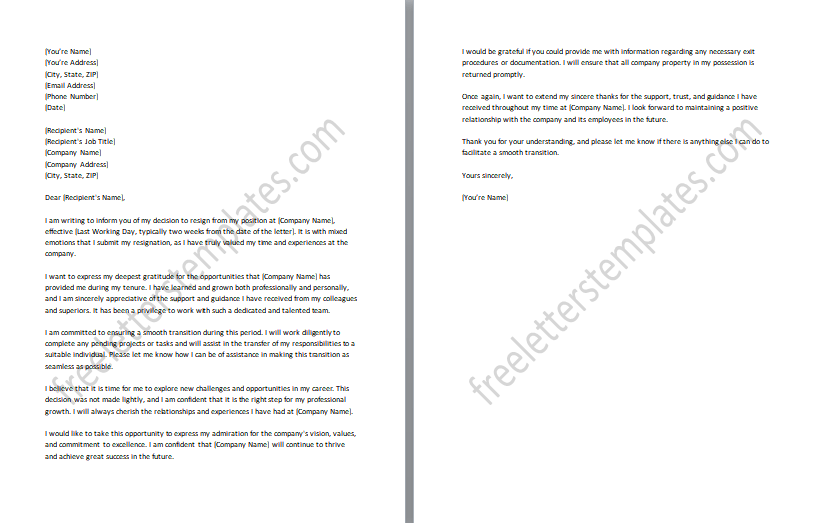
#2: Two Weeks Notice Resignation Letter:
Give your employer a two-week notice period before your departure. A Two Weeks Notice Resignation Letter is a formal communication to inform your employer that you will be resigning from your position, providing a standard two-week notice period. This letter serves as a professional courtesy, giving your employer sufficient time to make necessary arrangements and find a suitable replacement. By providing a two-week notice, you demonstrate respect for your employer and colleagues, allowing for a smooth transition of responsibilities. This letter is essential in maintaining a positive relationship and leaving on good terms with your current employer, ensuring that you uphold your professional reputation even as you move on to new opportunities.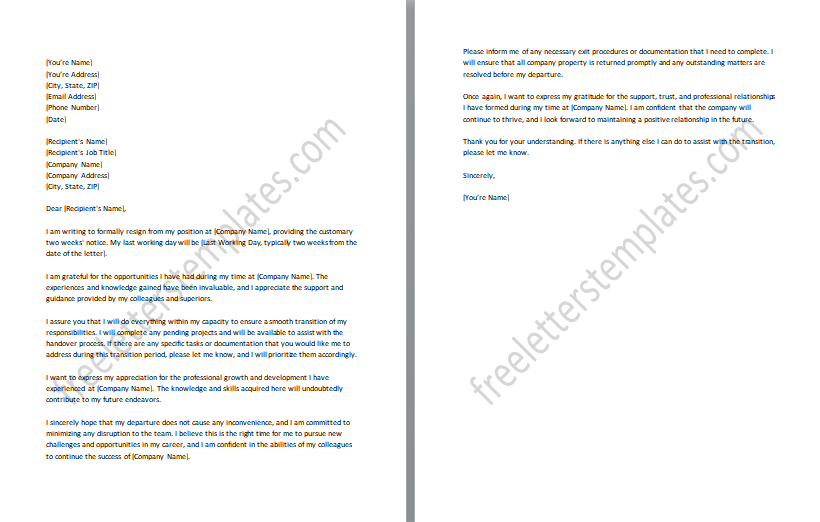
#3: Immediate Resignation Letter:
Informing your employer that you will be resigning effective immediately. An Immediate Resignation Letter is a formal notification to inform your employer that you will be resigning from your position without providing a notice period. This letter communicates your decision to leave the company immediately and is typically used in urgent or unforeseen circumstances that require an immediate departure. While immediate resignations are not ideal, sometimes personal or professional reasons may necessitate such action. It’s important to be respectful and professional in this letter, expressing gratitude for the opportunities provided and acknowledging any inconvenience caused by the sudden resignation. The purpose of this letter is to formally document your decision, maintain professionalism, and minimize disruption to the organization as much as possible.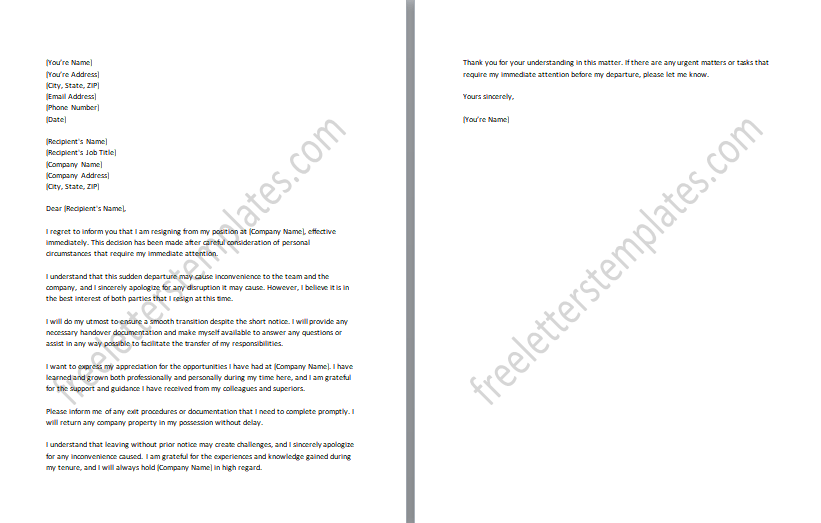
#4: Short and Simple Resignation Letter:
A concise letter conveying your resignation without unnecessary details. A Short and Simple Resignation Letter is a brief and straightforward communication to inform your employer of your decision to resign from your position. This letter aims to convey your resignation in a concise manner, without going into unnecessary details or explanations. It is a clear and direct message that states your intention to leave the company without delving into specific reasons or circumstances. The purpose of this letter is to maintain professionalism while keeping the communication succinct and to the point. By using a short and simple format, you ensure that your resignation is communicated clearly and efficiently.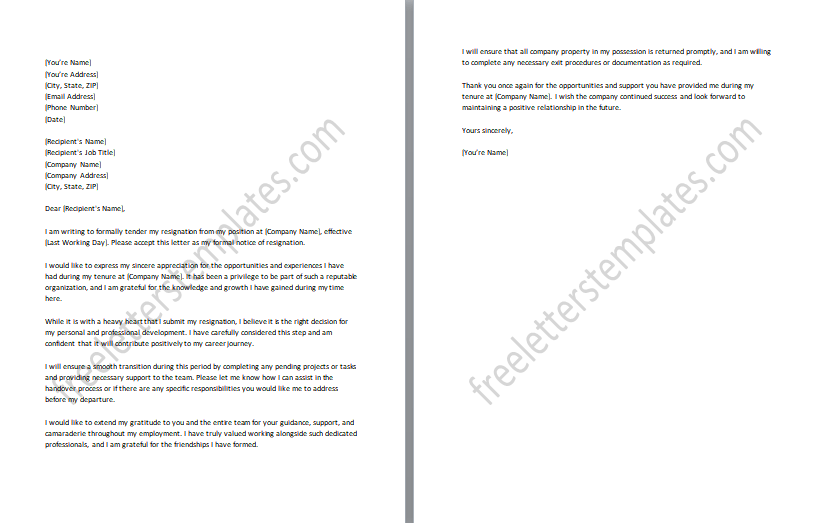
#5: Email Resignation Letter:
Sending your resignation via email, which can be useful for remote work or urgent situations. An Email Resignation Letter is a convenient way to formally announce your resignation to your employer, especially in remote work situations or when time is of the essence. Instead of sending a physical letter, you can use email to convey your decision. In the email, you should clearly and respectfully state that you are resigning, mention the date when your resignation will take effect, and express your gratitude for the experiences and opportunities you’ve had. It’s important to strike a balance between being professional and maintaining a human touch in your email. This method allows for quick and efficient communication of your decision, while still ensuring that you show appreciation and professionalism in your resignation.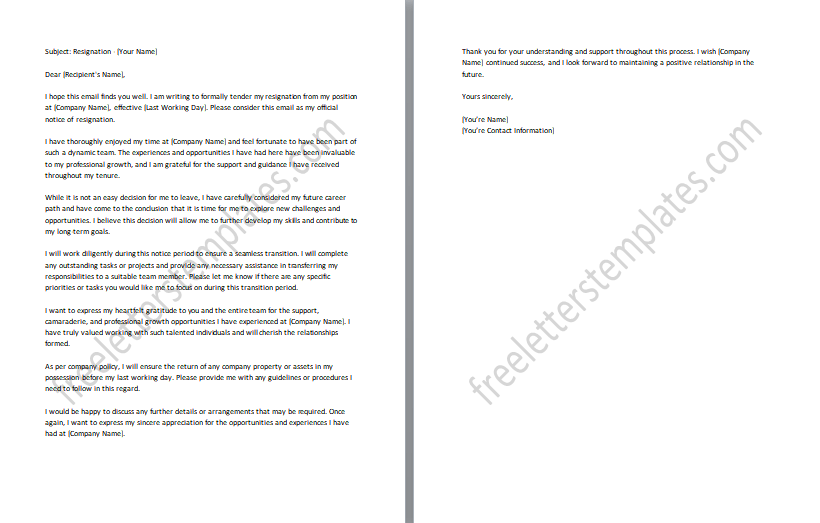
#6: Professional Resignation Letter:
A formal and polished letter demonstrating your professionalism throughout the resignation process. A Professional Resignation Letter is a formal and polished letter that showcases your professionalism and professionalism throughout the entire resignation process. This letter reflects your commitment to maintaining a high standard of conduct even as you transition out of your current position. It includes the necessary details such as your intention to resign, the effective date of your resignation, and any additional relevant information requested by your employer. The tone of the letter remains respectful, appreciative, and focused on the professional aspects of your departure. The purpose of a Professional Resignation Letter is to leave a lasting impression of professionalism, ensuring that you maintain a positive reputation and relationship with your employer and colleagues even as you move on to new opportunities.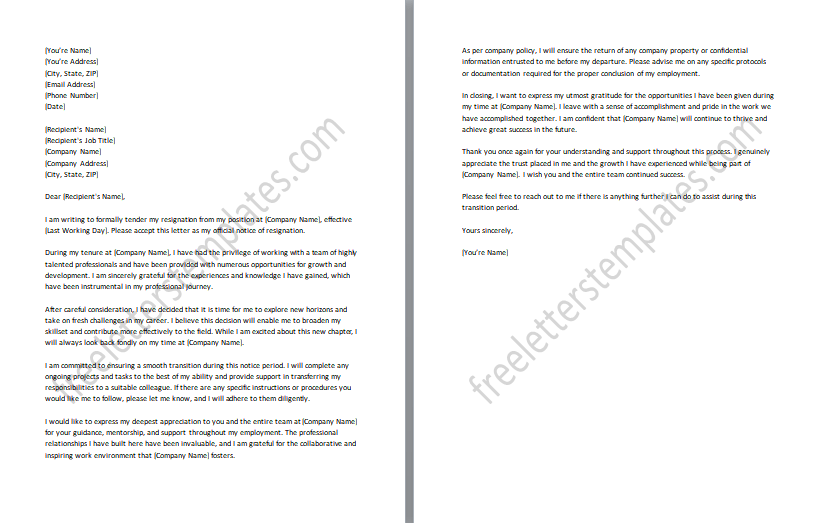
#7: Resignation Letter with Appreciation:
A Resignation Letter with Appreciation is a heartfelt expression of gratitude towards your employer for the experiences and opportunities you have had while working with them. In this letter, you sincerely acknowledge and appreciate the positive impact the company has had on your personal and professional growth. You can highlight specific accomplishments, valuable skills acquired, and the support of colleagues or mentors who have contributed to your development. By expressing genuine appreciation in your resignation letter, you aim to leave on a positive note, maintaining a strong relationship with your employer and leaving a lasting impression of gratitude and professionalism.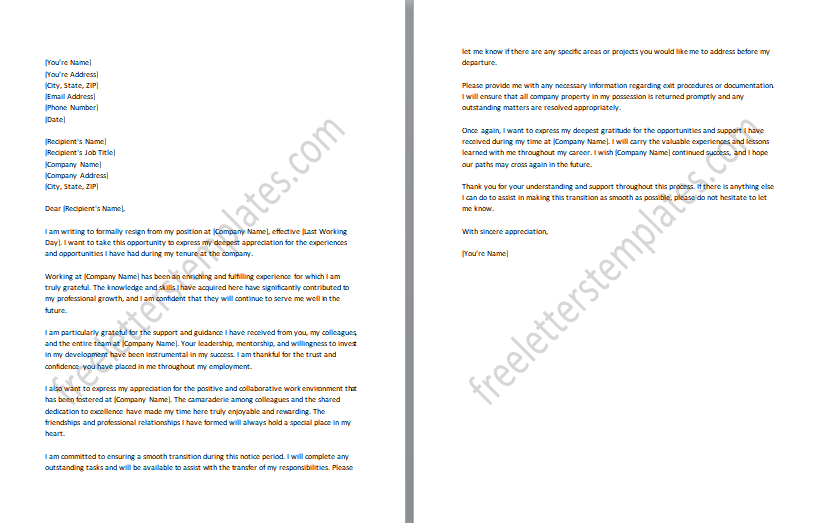
#8: Resignation Letter With Regret:
Conveying regret about leaving your current position but explaining your reasons for doing so. A Resignation Letter with Regret is a letter in which you express genuine remorse about leaving your current position while also explaining your reasons for doing so. This letter conveys a sense of sadness or disappointment about the decision to resign, highlighting the positive aspects of your job and the relationships you have formed. However, it also explains the circumstances or factors that have led to your resignation, such as personal or career growth opportunities elsewhere. By addressing your regret and providing a clear explanation, you aim to maintain open communication and understanding with your employer. This letter demonstrates your professionalism, honesty, and sincerity, leaving the door open for potential future collaboration or references.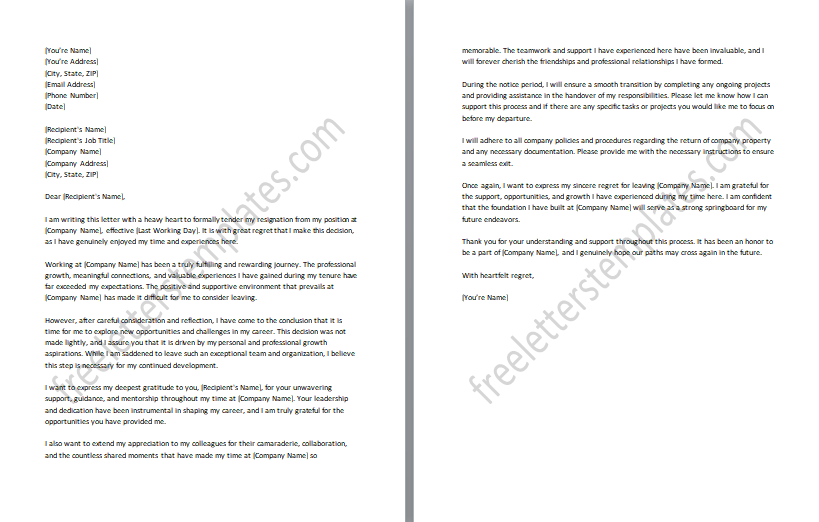
#9: Resignation Letter for Career Advancement:
A Resignation Letter for Career Advancement is a heartfelt message where you convey your decision to resign in order to pursue new opportunities or advance your career. In this letter, you express your excitement and eagerness to take the next step in your professional journey. You can mention the valuable experiences and skills gained during your time with the company, which have contributed to your growth and prepared you for this new chapter. While showing gratitude for the support and opportunities provided, you explain how this decision aligns with your long-term career goals. By sharing your aspirations and expressing appreciation, you aim to maintain a positive relationship with your employer and leave a lasting impression of professionalism and ambition.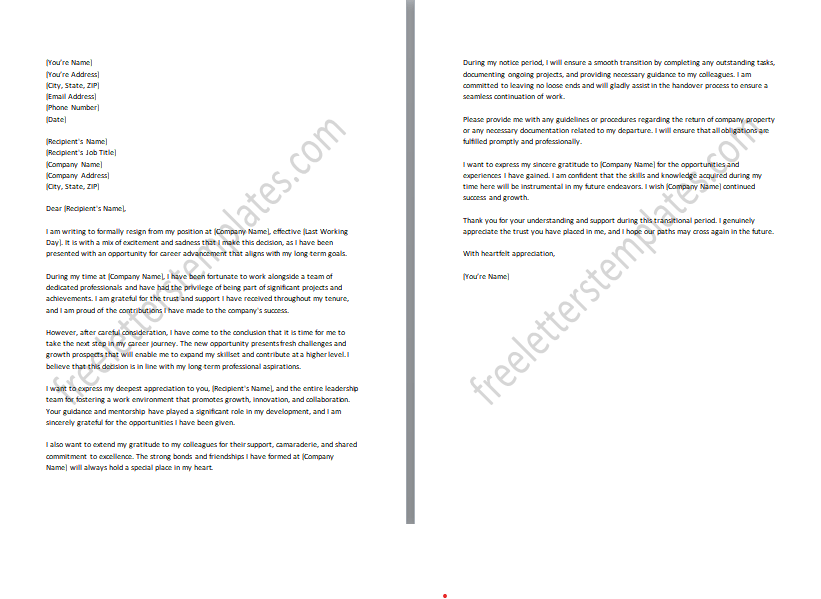
#10: Resignation Letter for Personal Reasons:
A Resignation Letter for Personal Reasons is a heartfelt message explaining that personal circumstances necessitate your resignation from your current position. It’s a letter that reflects honesty and vulnerability as you share that important personal factors require your attention and care. While not divulging all details, you assure your employer that these reasons hold significance. Expressing gratitude for the opportunities and experiences, you emphasize the positive aspects of your time with the company. Through sincere communication, you aim to maintain a respectful and understanding relationship, leaving room for potential future opportunities.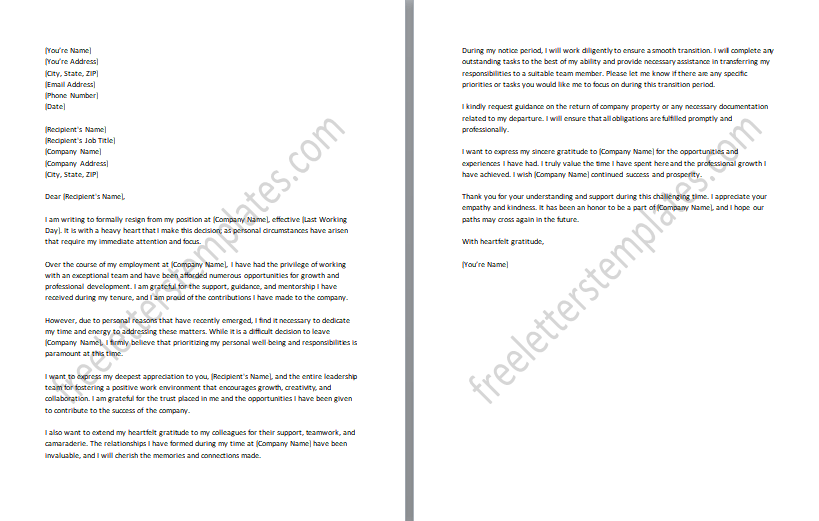
#11: Resignation Letter for Health Reasons:
A Resignation Letter for Health Reasons is a personal and sincere letter where you inform your employer that health issues are the primary reason for your resignation. You share that your health requires your full attention and focus. While it’s a difficult decision, you appreciate the opportunities and support provided. You hope for understanding and compassion. Expressing gratitude for the experiences gained, you prioritize your well-being while aiming to maintain a positive relationship.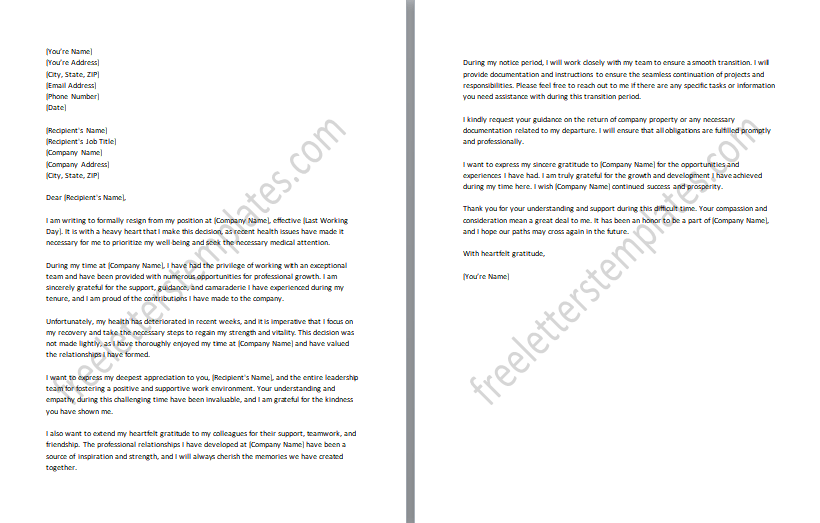
#12: Resignation Letter for Relocation:
Explaining that you are resigning due to a planned or unexpected relocation. A Resignation Letter for Relocation is a heartfelt letter where you explain that you are resigning from your current position due to a planned or unexpected relocation. In this letter, you express the mixed emotions that come with the decision to leave behind a job you have enjoyed.
You share that the relocation, whether for personal or professional reasons, has presented a new opportunity or necessity in your life. While you are sad to leave your current role and the relationships you have built, you understand that this move is necessary for your personal growth or family obligations. You express gratitude for the experiences, support, and friendships you have gained during your time with the company. By conveying the genuine conflict of emotions and the reasons behind your relocation, you aim to maintain a positive and understanding relationship with your employer, while embarking on a new chapter in your life.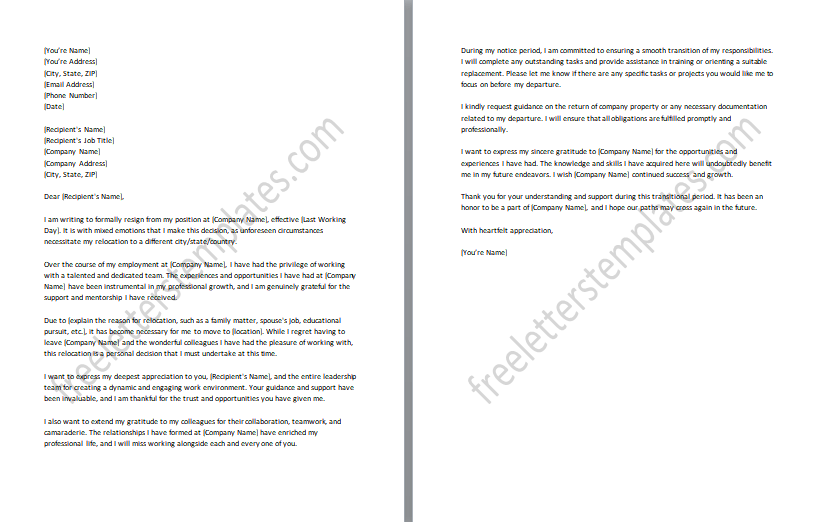
#13: Resignation Letter for Higher Education:
Stating your intention to resign in order to pursue further education or academic endeavors. A Resignation Letter for Higher Education is an optimistic and enthusiastic letter where you state your intention to resign from your current position in order to pursue further education or academic endeavors. In this letter, you convey your passion for learning and personal growth, emphasizing your commitment to advancing your knowledge and skills in a specific field.
You express gratitude for the opportunities and experiences gained from your current role, acknowledging the contributions it has made to your personal and professional development. It’s important to convey your excitement about the educational opportunities ahead and how they align with your long-term career goals. By sharing your aspirations and expressing appreciation, you aim to maintain a positive relationship with your employer and leave a lasting impression of ambition and dedication.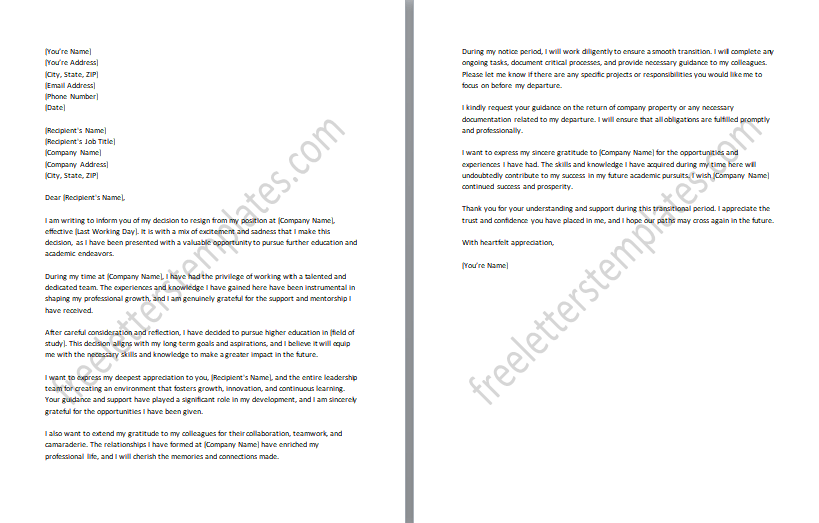
#14: Resignation Letter for Family Responsibilities:
Explaining that family obligations or caregiving responsibilities necessitate your resignation. A Resignation Letter for Family Responsibilities is a heartfelt message where you explain that your decision to resign stems from the significant responsibilities and obligations you have towards your family. In this letter, you openly share the deep sense of duty and love you feel toward your loved ones. You express that while you have cherished your time with the company and the experiences you’ve gained, the needs of your family have become your top priority. It’s not an easy decision, as you genuinely appreciate the support and opportunities provided by your employer.
However, finding a balance between work and family has become increasingly challenging. By sharing your situation with honesty and vulnerability, you hope for understanding and compassion from your employer. Expressing gratitude for the experiences gained during your time with the company, you aim to maintain a positive relationship while prioritizing the well-being and happiness of your family.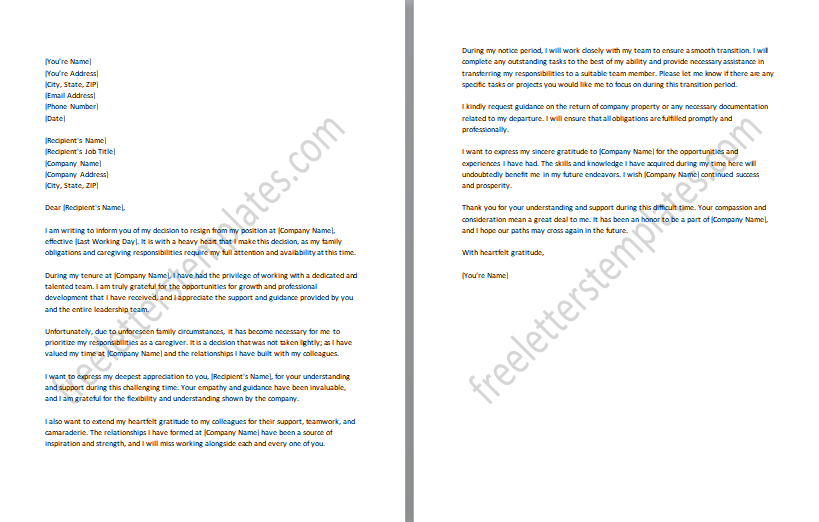
#15: Resignation Letter for Dissatisfaction:
Expressing your dissatisfaction with certain aspects of your job as the reason for your resignation. A Resignation Letter for Dissatisfaction is a letter where you express your dissatisfaction with certain aspects of your job as the reason behind your decision to resign. You convey your unhappiness and frustration with specific elements that have impacted your job satisfaction. It’s important to communicate these concerns respectfully and constructively, focusing on the issues rather than blaming individuals.
You may highlight areas such as a lack of growth opportunities, inadequate work-life balance, or a toxic work environment. By expressing your dissatisfaction, you hope that your feedback will contribute to positive changes within the company. You aim to maintain professionalism while explaining that these factors have led to your resignation.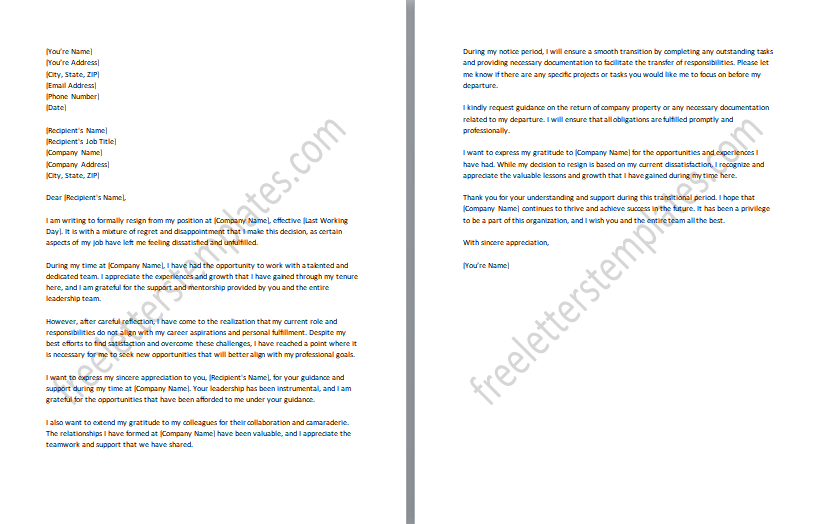
#16: Resignation Letter for Company Dissatisfaction:
Detailing your disappointment with the company’s policies, practices, or work environment. A Resignation Letter for Company Dissatisfaction is a detailed letter where you express your disappointment with the company’s policies, practices, or work environment as the primary reason for your resignation. In this letter, you provide specific examples and instances that have led to your dissatisfaction. You may address issues such as lack of transparency, ineffective leadership, inadequate support or resources, or a culture that doesn’t align with your values. It’s important to maintain a professional and constructive tone while expressing your concerns. By sharing your feedback, you hope for positive changes within the company and a better work environment for future employees.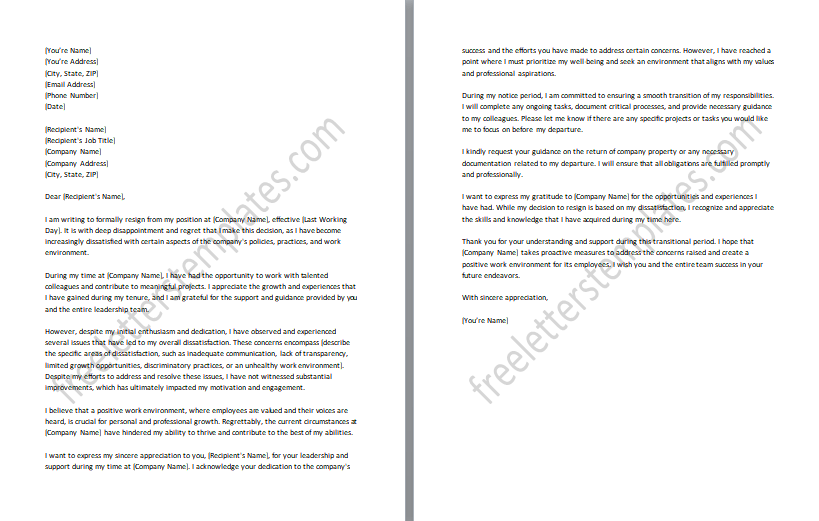
#17: Resignation Letter for Career Change:
Indicating that you are resigning to transition into a different field or industry. A Resignation Letter for Career Change is a letter where you indicate that you are resigning from your current position to pursue a transition into a different field or industry. In this letter, you express your excitement and eagerness to embark on a new professional journey. You explain that this decision aligns with your long-term career goals and aspirations for personal growth. You express gratitude for the opportunities and experiences gained from your current role, acknowledging the valuable skills and knowledge acquired. By sharing your intention to pursue a different path, you aim to maintain a positive relationship with your employer while embracing new opportunities for career development.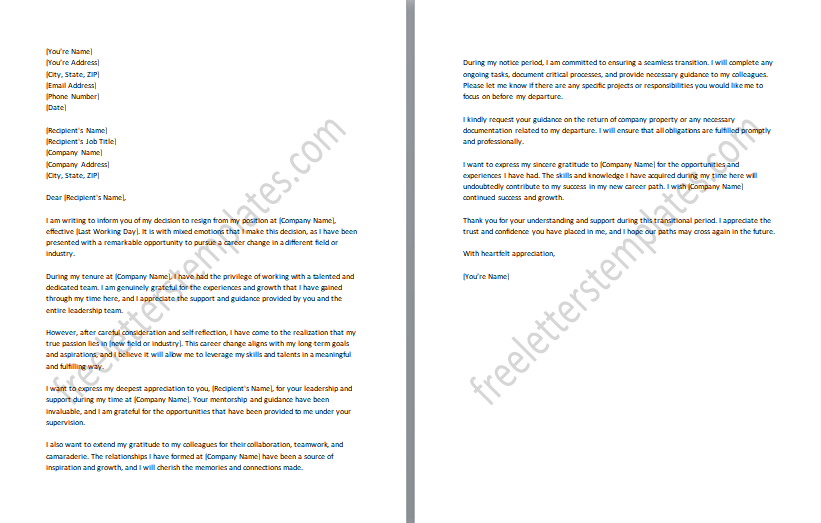
#18: Resignation Letter for Maternity/Paternity Leave:
Informing your employer that you will not be returning to work after your parental leave. A Resignation Letter for Maternity/Paternity Leave is a letter where you inform your employer that you will not be returning to work after your parental leave. In this letter, you express your gratitude for the support and opportunities provided by the company during your employment. You share the joy and excitement of becoming a parent and explain that your focus and priorities have shifted toward your family. While you value your time with the company, you have made the decision to prioritize your role as a parent and dedicate your time and energy to your child. By conveying this decision with appreciation and understanding, you aim to maintain a positive relationship with your employer while embracing the responsibilities of parenthood.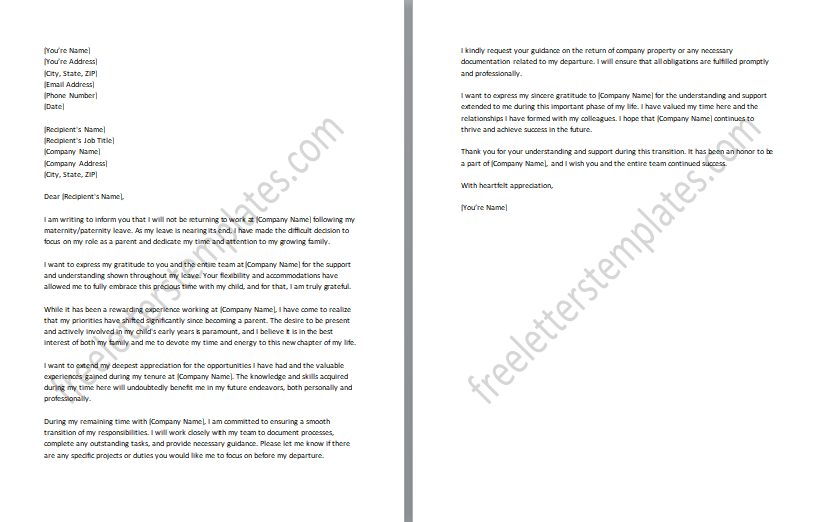
#19: Resignation Letter for Retirement:
Announcing your retirement from the workforce and expressing gratitude for the opportunities provided. A Resignation Letter for Retirement is a letter where you announce your retirement from the workforce and express gratitude for the opportunities provided. In this letter, you convey your decision to transition into the next phase of your life and embrace a well-deserved retirement. You express sincere appreciation for the experiences, growth, and support received throughout your career. By sharing this news with gratitude and warmth, you aim to leave a lasting impression of appreciation and maintain positive connections with your colleagues and employer as you embark on this new chapter in your life.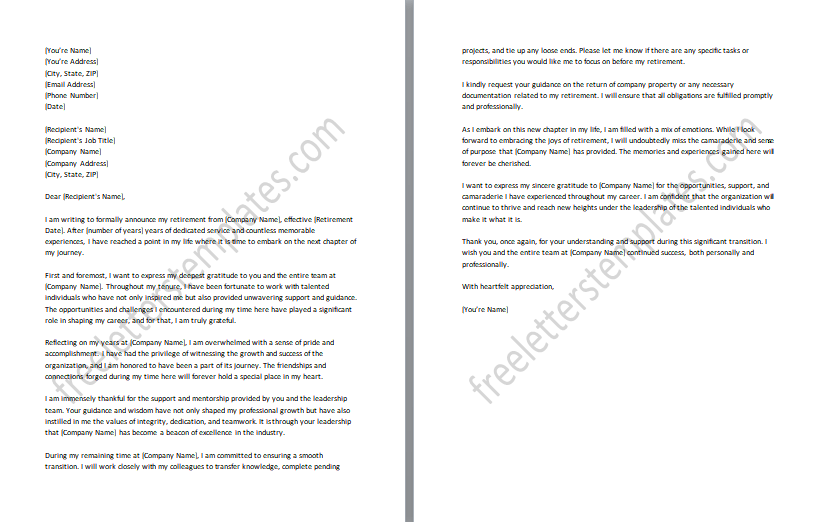
Resignation Etiquette Guide
- Timing: It is important to consider the timing of your resignation and provide sufficient notice to your employer. The standard practice is to give at least two weeks’ notice, although some companies may have specific policies regarding notice periods. Resigning with ample time allows your employer to make necessary arrangements and ensures a smoother transition for everyone involved.
- Notifying Colleagues: While it is not mandatory, it is considered courteous to personally inform your immediate supervisor or manager about your decision to resign before submitting a formal resignation letter. This shows respect and allows for open communication regarding your departure. You may also choose to inform your colleagues, team members, and close work contacts about your resignation in person or through a thoughtful email.
- Handling Exit Interviews: If your company conducts exit interviews, it is a good opportunity to provide feedback on your experience, both positive and constructive. Be honest but tactful in your responses, focusing on specific issues or areas that could benefit from improvement. Remember to maintain a professional and diplomatic tone during the exit interview, as your comments will be shared with relevant stakeholders.
- Resignation Letter Content: Your resignation letter should be concise, respectful, and to the point. Clearly state your intention to resign, and the effective date of your departure, and express gratitude for the opportunities and experiences you have had with the company. Avoid negativity or criticism in your resignation letter, as it is essential to leave on a positive note.
- Transitioning Responsibilities: Once your resignation is accepted, work with your employer to ensure a smooth transition of your responsibilities. Offer assistance in training or transitioning your tasks to a colleague or replacement, and provide any necessary documentation or resources to facilitate the handover process. This helps maintain professionalism and ensures continuity within the organization.
Closing Remarks
In conclusion, navigating the process of resigning from a job requires understanding and adhering to proper resignation letter etiquette. By following the guidelines and best practices outlined in this guide, you can ensure a professional and respectful departure from your current position. From timing your resignation and notifying colleagues to handle exit interviews and expressing gratitude, each step plays a crucial role in maintaining positive relationships and leaving a lasting impression. Remember, a well-crafted resignation letter not only reflects your professionalism but also sets the tone for future references and potential networking opportunities. We hope this comprehensive resource has provided valuable insights and tools to assist you in composing a thoughtful and effective resignation letter. By approaching the resignation process with grace and professionalism, you can transition smoothly to new opportunities while leaving behind a positive legacy in your current workplace.